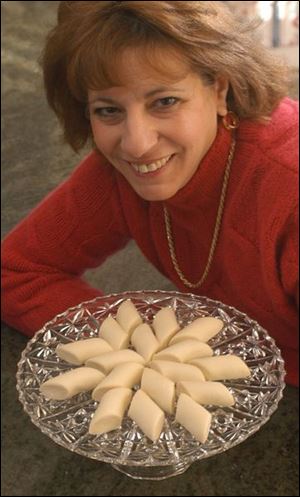
Food customs for Ramadan
11/18/2003Throughout Ramadan, the month-long fast observed by Muslims, families and friends break the daily fast together after sunset with special dinners.
Each area of the Muslim world has favorite recipes for these dinners and for the holiday at the end of the month, according to the Council on American-Islamic Relations in Washington. The fast is followed to learn discipline, self-restraint, and generosity while obeying God s commandments.
There are a wide variety of foods and customs observed.
Except for breaking the fast with dates and water, there are no foods across the board that are Islamic, says Cherrefe Kadri of Oregon, who is a member of the Islamic Center of Greater Toledo in Perrysburg.
Ms. Kadri s heritage is Lebanese. “One of the foods that is popular is a date-filled cookie called maamoul, and also a shortbread-type cookie called ghraibe. I make [ghraibe] throughout Ramadan, sometimes once a week.”

Cherrefe Kadri with ghraibe.
The ghraibe is a butter cookie served for dessert, often at these dinners. “[One] Sunday evening, my cousin had a dinner. I don t like to go empty-handed. I took a plate of ghraibe. She has a huge dessert table,” says Ms. Kadri.
“Not everybody makes ghraibe. It s not that they re difficult, but they are a little time-consuming.”
The recipe is both Lebanese and Syrian. “It s hard to distinguish the two cuisines because they are so close regionally, and the foods are very similar,” says the Toledo attorney. “My recipe comes from John Shousher s mother.
A plate of ghraibe made by Ms. Kadri has perfectly shaped oblong cookies, crystal white in color because of the low baking temperature of 275 degrees and the use of powdered sugar rather than granulated sugar. “You don t brown these cookies,” she explains. “Also, clarified butter keeps the appearance lighter.”
The dough is rolled like a big rope and then pieces are “chopped off.” A sliver of almond or a pine nut can be placed on top of each piece before baking.
Most important, “I don t add the baking powder all at once,” says Ms. Kadri. “It s easy to get air pockets when you roll the big rope. You want to avoid air pockets. So I add a little baking powder to each of the sections of dough as I roll them.”
Family dinners are important to Ms. Kadri, whose mother was born in Detroit; her father immigrated from Lebanon. “I do a lot of cooking and baking,” she says. “I enjoy entertaining.”
Sometimes she has an open house when the holy month ends with Eid ul-Fitr or the Feast of Fast Breaking, which is Nov. 25. This year she has planned a buffet-style dinner before Eid ul-Fitr for family and friends. She ll prepare roasted chicken and rice, Lebanese dishes, and even stir-fry.
At these dinners “food isn t the main focus,” she says. “It s being together and being with family. Ramadan is a festive time. Muslims focus is on unity during the month of Ramadan to share the special time throughout the month.”